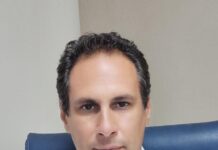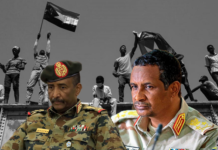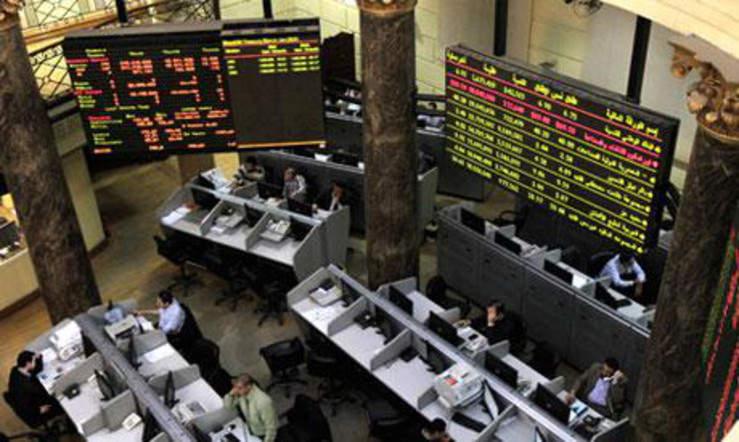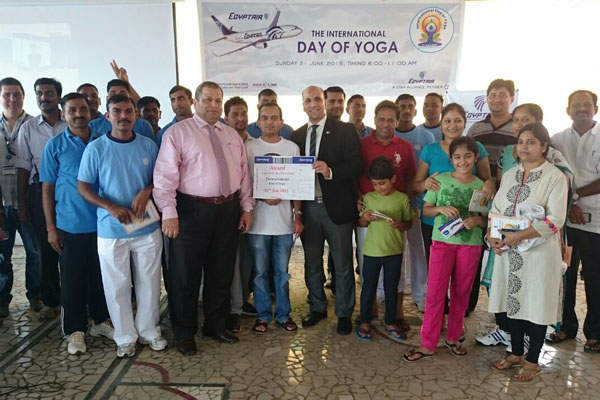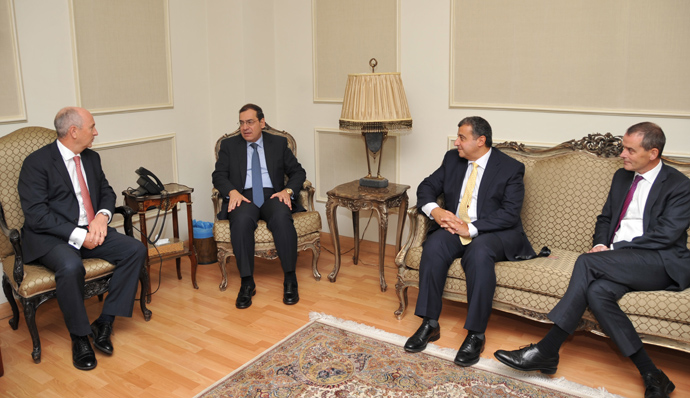Brotherhood’s experiment in Sudan is ‘a crime against Islam’
Al Sadiq Al Mahdi, the Sudanese former prime minister and leader of the Umma Party, said Sudan today is under international guardianship and more than 35 thousand foreign troops are present. President Omar al-Bashir is wanted by the International Court of Justice, he said, pointing out that the United Nations Security Council under Chapter VII, had issued 62 resolutions against Sudan, which means that the Sudanese regime threatens world peace and security.
He added that the Muslim Brotherhood’s experiment in Sudan was a major crime against Islam because it raised Islamic slogans to apply a fascist regime that led to the backwardness of the state due to restriction of freedoms, justice and tightening the rights of citizens. The Middle East Observer met him and following
In your opinion, what is the correct way for Sudan to join in a serious dialogue?
It is well-known that all Sudan’s 16 agreements were brokered through international mediation or the mediation of the Intergovernmental Authority on Development (IGAD), an eight-country trade bloc in Africa, Ethiopia or Doha and therefore all the agreements were outside Sudan and under international auspices. The African Union has a council named the African Peace and Security Council that comprises 15 members from the African Union. The Council has chosen a mechanism to mediate in Sudanese affairs, headed by former South African President Thabo Mbeki. This mechanism initiated contacts with all the Sudanese parties, commissioned by the African Peace and Security Council, and it was able to establish contact with all the parties. The body, headed by Thabo Mbeki, called for a meeting in Addis Ababa to be held inside the offices of the African Union in order to reach an agreement. However, after the Sudanese government agreed to this invitation in March 2015, it turned it down and did not attend.
Therefore, forces opposing the regime went to Addis Ababa and met with members of the African mechanism. After the meeting Mbeki met with the regime and invited them once again for a meeting with all the parties to draw up a roadmap for dialogue. The Sudanese authorities refused and told him they do not have any dialogue except inside Sudan and within the framework of the 7 +7. Mbeki conveyed the message and we refused to hold dialogue inside Sudan.
What were the guarantees you requested from the African mediator?
We asked him that the African mediation mechanism inform the African Peace and Security Council to issue a resolution on starting the dialogue based on a specific roadmap with the regime under international auspices abroad and ending with holding a national constitutional conference in Khartoum; to draw up executive mechanisms and a timetable for democratic transition of power in a way that meets the legitimate aspirations of the Sudanese people. The resolution should include the African mediator’s authority to refer reports internationally accredited and to evaluate the responsiveness of each party as regards reaching a solution.
Some accuse you of wanting to internationalize the issue .. How do you see that?
These words are being said to deceive people. Sudan is under international guardianship and there are 35 thousand foreign troops in Sudan. President Omar al-Bashir is wanted by the International Court of Justice and Sudan now has 62 resolutions issued against it by the United Nations Security Council under the seventh chapter. Some four million Sudanese nationals are living on foreign relief aid and all this confirms that Sudan is under foreign guardianship. The Sudanese regime has restricted the state, which had never happened in its history, through international resolutions, international troops and international guardianship. What we call for is not internationalizing the case but to have dialogue as part of a neutral mechanism and not to be headed by one of the parties to the conflict. It should be from outside Sudan in order to complete the image and to have mutual confidence and the final agreement be reached in a Council we call the “national constitutional conference” to take place inside Sudan. Discussions inside is the end of the road and not the beginning.
What are the roots of the Ethiopian-Sudanese disputes over Al Fashqa land?
Yes, there are large differences, Sudan is excessively establishing relations with all African countries not only Ethiopia. Al Fashqa land is very fertile in eastern Sudan and there is a conflict between Khartoum and Addis Ababa over it. We have agreed with the Ethiopian government to settle on this topic, they recognise that this land is Sudanese but they can invest in it. However, now the issue of Al Fashqa is being given up by the current regime.
What is the role played by Cairo in settling the political crisis in Sudan?
We believe that there is a great deal of negligence on Cairo’s part regarding Sudan. In 1999 when Washington sought to find a solution to the Sudanese crisis it preferred that the file should be handled by former Kenyan president Daniel Arap and former president Hosni Mubarak and Sudan agreed on that. However, we talked with Egyptian officials and assured them that in the best interest of Sudan, Egypt should intervene in this issue but Cairo refused because at that time there was a self-determination and the Sudanese agreed that if an agreement was reached with the southerners, then the self-determination should be applied but Cairo refused. We told them “you did not agree on the self-determination but say that we agree on what the Sudanese people agree” but they also refused and this made the Egyptian government abandon the Sudanese file and in my opinion this was a big mistake.
How do you see the Renaissance Dam and how to resolve this crisis now?
In Sudan and Egypt we have to admit that we have created a cold war in the Nile Basin because in 1959 we agreed to divide the River Nile water without the presence of the upstream countries. We rejected their presence and a bloc was established among the upstream countries. There is nothing in common between the Ethiopian plateau and the Equatorial plateau except an opposition stance regarding Sudan and Egypt and we have given them a reason to take this stance against us because we neglected them. The second mistake made by Ethiopia and Sudan was that they underestimated the upstream countries as we believed we could do anything as long as the water came from these countries to our countries as it had in the past. However, the technological changes created two new elements: first the possibility of transferring water to dry areas and the second is the production of electricity. This, created interest in water that was once just sources that they did not benefit from. The other thing is the increasing population which urged them to take advantage of this water in development projects.
What is Sudan’s stance regarding this dam?
The Renaissance Dam brings benefits to Sudan more than damage so it is closer to the stance of Ethiopia than Egypt. The most important of these benefits is that it blocks water because the evaporation rate in this area is lower than any other area in the north and flood of the Blue Nile strongly rushes during the first three months and the construction of the dam protects Sudan from the harmful effects of the flood such as clay which reduces the life span of our dams. Also, the dam will generate electricity at a lower cost to Sudan, but the damage to Sudan and Egypt is that it will strengthen the Ethiopian influence and if political differences emerged between upstream and downstream states, Ethiopia will use the dam politically.
What is the solution?
The Renaissance Dam has become a reality because it occurred away from any agreement between the upstream and downstream countries but the countries concerned should agree on three things. Firstly, the water storage speed in the lake should not affect the quota of Egypt and Sudan in the Nile water, secondly, the dam should be managed by Egypt, Sudan and Ethiopia and thirdly, an agreement on neutralizing the issue of the dam should be reached. This agreement should be presented to the Security Council so that the Nile water should not be used as a political weapon and I find that this is possible, because Ethiopia knows that any kind of political action in the Nile River water will bring about a lot of damage to it and it does not want to create problems.
How do you see the experiment of the Muslim Brotherhood in Sudan?
The Brotherhood’s experiment in Sudan was a major crime against Islam because it raised Islamic slogans for the sake of applying a fascist regime that led to creating a backward state due to restricting freedoms, justice and denying the rights of the people. The Brotherhood experiment resulted in the division of Sudan, the outbreak of wars and ill reputation abroad. As regards Egypt, many reasons have led to loss of credibility such as the constitutional declaration and control of the judiciary in the era of Morsi when the Egyptians discovered that the group was directing their president.
How do you see the issue of Halayib and raising it internally from time to time?
Raising the issue of Halayib more than once by the Sudanese regime is for internal mobilization against Egypt and to drive the Sudanese citizen away from the difficult internal issues in Sudan. In my opinion this issue can be tackled away from the media.
What about the Sudanese-Iranian relations which have witnessed tension recently?
There is huge security cooperation between the Sudanese and Iranian security bodies as Iran trains Sudanese security bodies. The Sudanese and Iranian regimes have close relations and Iran contributes to the military production in Sudan and therefore Sudan’s participation in the Operation Decisive Storm, despite the fact that it was a media show, yet it was a surprise. The participation was an attempt to activate the economic sector by the Gulf States.






